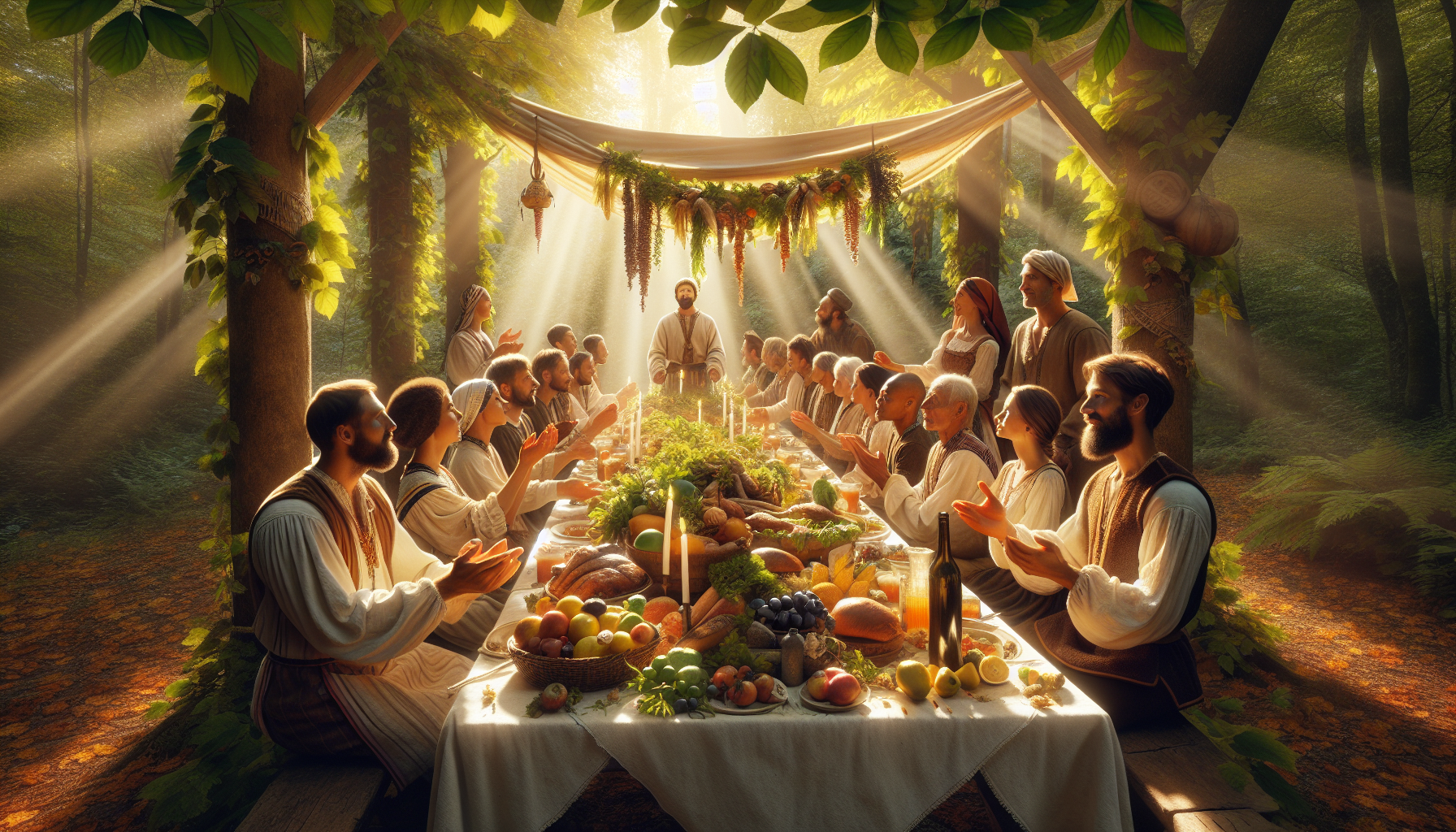In a world where culinary traditions are as diverse as the cultures that create them, there’s something profoundly universal about gathering around a table to share a meal. Yet, not all meals are simply about satiating hunger; some hold deeper meanings, weaving the fabric of community, gratitude, and history. One such tradition is the mesmerizing “Feast on Fortune,” a celebration that transcends the simple act of eating, transforming it into a rich tapestry of blessings and cultural expression. 🍽️
At the heart of the Feast on Fortune is the First Hunt, a ritual steeped in antiquity that marks the beginning of the hunting season in several indigenous and rural communities. This event is not just about the hunt itself but is a time-honored ceremony that celebrates the bond between humans and nature, a relationship built on respect, sustainability, and gratitude. The First Hunt is a communal event where young hunters embark on their inaugural journey, guided by seasoned elders who impart knowledge passed down through generations. As they navigate the wilderness, these novices are not only honing their skills but are also learning to appreciate the delicate balance of the ecosystem they are a part of.
The journey from the forest to the feast table is where the magic truly unfolds. The First Hunt is not just a test of skill and endurance; it’s a rite of passage that culminates in a communal feast, symbolizing prosperity, unity, and the shared joy of a successful hunt. The freshly procured game, treated with the utmost respect, is prepared using traditional recipes that have been safeguarded through time. This meal is more than nourishment for the body; it is a sacred offering that honors the spirits of the land and the animals that have given their lives, thus ensuring that the cycle of life continues with blessing and abundance. 🦌
As we delve into the intricate layers of this tradition, we’ll explore the symbolic dishes that grace the feast table, each with its own story and significance. From hearty stews simmered with wild herbs to bread baked with ancient grains, every bite is a testament to the resilience and creativity of the people who partake in this age-old celebration. We will also uncover the rituals that accompany the feast, such as the sharing of tales, songs, and dances, which not only preserve the cultural heritage but also strengthen the communal bonds that are essential for the survival of these traditions in the modern world.
Exploring the Origins of the First Hunt Food Blessings Tradition
The tradition of the First Hunt Food Blessings, also known as “Feast on Fortune,” is a fascinating cultural ritual with deep historical roots. This tradition, observed in various indigenous communities, celebrates the first successful hunt of the season. The practice is more than just a feast; it is a ceremony that symbolizes gratitude, respect for nature, and the sharing of abundance. Understanding its origins requires a dive into the historical context of the communities that practice it, their relationship with nature, and how these elements have evolved over time.
The origins of this tradition are steeped in the ancient practices of hunter-gatherer societies. These communities relied heavily on the land and its resources for survival. Hunting was not merely a means of sustenance but a central element of their culture and social structure. The First Hunt Food Blessings thus served as a way to honor the spirits of the animals hunted and to express gratitude to the land for its bounty. It was believed that such rituals ensured continued success in future hunts and maintained a harmonious balance with nature.
As societies evolved, so did the traditions surrounding the First Hunt. Over centuries, different indigenous groups adapted the practice to suit their unique environments and societal structures. Despite these variations, the core essence of the tradition—gratitude, respect, and communal sharing—remained unchanged. This adaptability highlights the resilience of cultural traditions and their ability to endure through time, offering insights into the spiritual and social fabric of these communities.
The Symbolism and Rituals of the Feast on Fortune
The First Hunt Food Blessings are rich in symbolism, reflecting the deep spiritual connection between the people and the natural world. Every element of the feast is carefully selected to represent different aspects of life and nature. For instance, the choice of food is symbolic; each dish is prepared using ingredients sourced from the first hunt, emphasizing the theme of renewal and abundance. The preparation and consumption of these dishes are often accompanied by traditional songs and dances that invoke the spirits and celebrate life.
Rituals play a crucial role in the First Hunt Food Blessings. Typically, the ceremony begins with a blessing of the food, where a community elder or spiritual leader offers prayers and thanks to the spirits. This is followed by the sharing of food, symbolizing community unity and the collective effort involved in the hunt. During the feast, stories of past hunts and legends are shared, reinforcing cultural heritage and educating younger generations about the importance of maintaining harmony with the natural world.
The ritualistic aspect of the First Hunt Food Blessings is not just about tradition but also about reinforcing social bonds. The feast serves as a communal gathering, bringing together individuals and families to celebrate the fruits of their collective labor. This sense of community and shared purpose is central to the practice, fostering a sense of belonging and continuity across generations.
Modern Adaptations and Cultural Significance
In the modern world, the First Hunt Food Blessings have undergone various adaptations. As indigenous communities face challenges such as globalization and environmental changes, the tradition has been adapted to address these issues while preserving its core values. Many communities now incorporate modern elements into their rituals, such as using sustainable hunting practices and integrating contemporary music and art forms into their celebrations.
The cultural significance of the First Hunt Food Blessings extends beyond the feast itself. In many communities, it serves as a reminder of the need for sustainable practices and respect for the environment. The tradition encourages a deeper understanding of ecological balance and the impact of human activities on nature. By promoting sustainable hunting and gathering practices, the feast helps ensure that future generations can continue to enjoy the bounty of the land.
In recent years, there has been a growing interest in the First Hunt Food Blessings from non-indigenous communities as well. This interest has been fueled by a broader movement towards sustainability and a desire to reconnect with nature. By participating in or learning about these traditions, individuals from diverse backgrounds can gain a greater appreciation for indigenous cultures and their profound relationship with the environment.
Watch a Related Video
To gain further insights into this rich tradition, watch the video “The Spirit of the Hunt: Indigenous Rituals and Ceremonies” by National Geographic. Watch it here.
Comparative Analysis of Similar Traditions Worldwide
While the First Hunt Food Blessings are unique to certain indigenous cultures, similar traditions can be found worldwide, each reflecting the cultural values and environmental contexts of the societies that practice them. These parallels offer a fascinating insight into how different cultures express gratitude and maintain a spiritual connection with nature.
| Tradition | Culture | Key Elements |
|---|---|---|
| First Hunt Food Blessings | Indigenous North American Tribes | Gratitude, communal sharing, ritualistic dances |
| Thanksgiving | United States | Feasting, gratitude, family gatherings |
| Harvest Festival | United Kingdom | Harvest collection, church services, communal meals |
| Pongal | India | Harvest celebration, cooking of Pongal dish, offering to deities |
The table above highlights some of the key similarities and differences between the First Hunt Food Blessings and other global traditions. For instance, while Thanksgiving in the United States focuses on family and gratitude, it lacks the specific ritualistic elements seen in the First Hunt Food Blessings. On the other hand, the Harvest Festival in the United Kingdom shares a similar emphasis on communal sharing and gratitude for nature’s bounty, akin to the First Hunt Food Blessings.
- The First Hunt Food Blessings emphasize a spiritual connection with nature.
- Thanksgiving is centered around family and historical gratitude.
- Harvest Festivals celebrate agricultural abundance and community unity.
- Pongal is a cultural celebration of the harvest, blending religious offerings with communal feasting.
Understanding these traditions and their cultural significance can enrich our appreciation of the diverse ways in which humans celebrate their connection with the earth. It invites us to reflect on our own practices and consider how they align with the values of gratitude, sustainability, and communal sharing.

Conclusion
In wrapping up our exploration of the captivating tradition of “Feast on Fortune: Unveiling the First Hunt Food Blessings,” we have journeyed through a rich tapestry of culture, history, and the communal values that bind societies together. This unique tradition, deeply rooted in the ethos of gratitude and abundance, offers an insightful lens into how communities celebrate and give thanks for nature’s bounty. It serves as a powerful reminder of our intrinsic connection to the earth and the cycles of life that sustain us.
At the heart of this tradition lies the ritual of blessing the first hunt, an act that signifies respect for nature’s generosity and a plea for continued prosperity. We discussed how this practice fosters a deep sense of community, bringing people together in a shared expression of gratitude and mutual support. It is through these communal gatherings that stories are passed down, wisdom is shared, and cultural identity is reinforced.
Moreover, the “Feast on Fortune” tradition highlights the importance of sustainable practices and mindful consumption. By honoring the first hunt, communities are encouraged to reflect on their consumption patterns and the impact of their actions on the environment. This consciousness is crucial in today’s world, where sustainability has become a key concern. The tradition serves as a timeless reminder that our survival and well-being are intricately linked to the health of our natural environment.
We also delved into the symbolism and rituals associated with this tradition, each imbued with deep cultural significance. From the preparation of the feast to the intricate ceremonies of blessing, every aspect is steeped in meaning and serves to reinforce communal bonds. Such traditions are invaluable cultural artifacts, offering insights into the values and beliefs that shape societies.
As we conclude, it is essential to recognize the enduring relevance of the “Feast on Fortune” tradition in contemporary society. In an increasingly fast-paced and disconnected world, such traditions offer a moment of pause, encouraging us to reconnect with our roots and with each other. They remind us of the importance of gratitude, community, and sustainable living.
We invite you, dear reader, to reflect on the themes discussed and consider how they might apply to your own life. Perhaps there is a tradition in your culture that resonates with the principles of gratitude and community we have explored here. If so, we encourage you to share your experiences and insights in the comments section below. Your contributions can help enrich our collective understanding of the diverse ways in which cultures around the world celebrate and give thanks.
Additionally, we encourage you to share this article with others who might find it inspiring or enlightening. By spreading awareness of such traditions, we can foster a greater appreciation for cultural diversity and the shared human values that transcend borders. 🌍✨
For those interested in exploring further, we recommend checking out these active resources for more insights into cultural traditions and their impact on communities:
– National Geographic’s Cultural Explorations
– UNESCO’s Intangible Cultural Heritage
Thank you for joining us on this journey through the “Feast on Fortune” tradition. We hope it has inspired you to appreciate the richness of cultural traditions and the lessons they offer for living a more connected and sustainable life. 🌿





